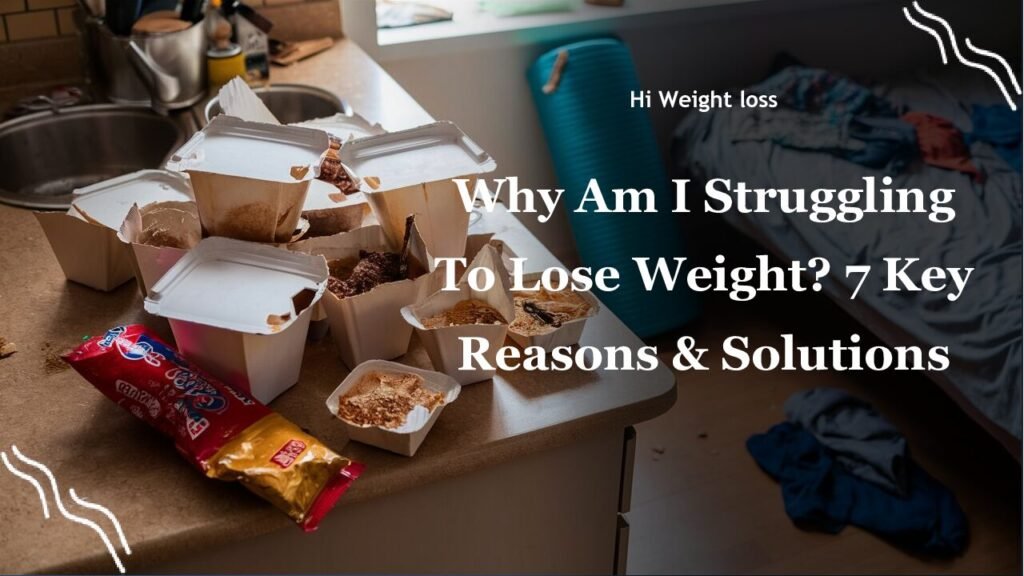“`
It’s incredibly frustrating when you’re trying your best to lose weight, but the scale just won’t budge; maybe you’ve even found yourself thinking, “Why am I struggling to lose weight so much?“. You’re diligently counting calories, hitting the gym, and yet, the pounds seem glued on, this is actually a situation many people face. This article will delve into the common reasons why you might be experiencing a weight loss plateau, from dietary pitfalls and sleep deprivation to stress and underlying medical issues, equipping you with the knowledge to navigate these hurdles and finally achieve your goals.
Why Am I Struggling to Lose Weight So Much?
The Calorie Conundrum: Are You Eating Too Much?
It might seem simple, but one of the main reasons people struggle to lose weight is consuming more calories than their body burns. I remember when I first started trying to lose weight, I thought I was eating healthy, but I wasn’t tracking my calorie intake at all. I’d snack mindlessly throughout the day, not even realizing how much I was actually consuming. Mindful eating, where you pay attention to your hunger cues and the act of eating itself, can help a great deal here. It is vital to keep in mind that calorie intake is paramount to weight loss.
The Sneaky Culprit: Processed Foods
Another huge factor in why you might be thinking “Why am I struggling to lose weight so much?” can be those processed foods that are readily available in supermarkets. These foods are often packed with empty calories, low in nutrients, and designed to make you crave more. A friend of mine once told me she felt like she was constantly hungry, even after eating large meals. When we looked at her diet, it was full of packaged snacks, fast food, and sugary drinks. This processed food pattern is common and can sabotage your weight loss efforts, so consider switching to whole and unprocessed foods.
Sleep: The Unsung Hero of Weight Loss
Are you getting enough sleep? Insufficient sleep can mess with your metabolism and increase hunger, making it harder to lose weight. I recall a time when I was working late and only sleeping about five hours a night. It is also linked to weight gain. It is also shown that women who slept five hours a night were more likely to gain weight than those who slept seven hours. It was a vicious cycle – I was tired, so I craved sugary snacks for energy, and my weight loss efforts completely stalled. Prioritizing sufficient sleep can make a significant difference.
Stress and Cortisol: The Weight Gain Connection
Chronic stress can lead to increased cortisol levels, which can actually promote fat storage, particularly around the abdominal area. During a particularly stressful period at work, I noticed I was gaining weight despite not changing my diet or exercise routine. It turns out, my body was holding onto extra weight due to the high cortisol levels caused by my stress. Finding healthy ways to manage stress, such as exercise or meditation, is essential for weight loss and overall well-being.
Medical Conditions: When Weight Loss Is an Uphill Battle
Sometimes, there are underlying medical conditions that can impact your ability to lose weight. Conditions like hypothyroidism, polycystic ovary syndrome (PCOS), and thyroid disease can affect metabolism and make weight loss much more challenging. Some medications can also contribute to weight gain. If you are doing all the right things and still not seeing results, it’s important to talk to your doctor to see if any of these medical conditions might be at play.
Consistency is Key: The Importance of Regular Habits
Perhaps you are asking yourself: “Why am I not losing weight despite diet and exercise?” and that’s a valid question, consistency is often the secret ingredient in any successful weight loss plan. Irregular exercise and unhealthy eating habits can definitely hinder your progress. I have a friend who goes hard at the gym for a couple of weeks, then skips it for a month. The same goes for food; one week, she’s eating well, and then she goes back to her old habits the next week. It’s essential to find a workout routine that fits your lifestyle and, most importantly, stick with it. Consistency is the foundation for long-term success.
Unrealistic Expectations: Are You Setting Yourself Up for Failure?
It’s so easy to get caught up in the quick-fix promises of fad diets. But, rapid weight loss isn’t sustainable, and often leads to disappointment. When I first started working out, I was desperate to lose 10 pounds in a week, but when I didn’t I got so frustrated I wanted to quit. It’s vital to have a realistic view of weight loss which is generally a slow process. It’s better to focus on making long-term, sustainable changes to your lifestyle.

To recap, here’s a table summarizing the key reasons why you might be struggling to lose weight:
| Reason | Explanation | Actionable Steps |
|---|---|---|
| Eating Too Much | Consuming more calories than your body burns. | Track your calorie intake, be mindful of portion sizes. |
| Processed Foods | Diet rich in empty calories and low in nutrients. | Choose whole, unprocessed foods like fruits, vegetables and lean proteins. |
| Insufficient Sleep | Disrupts metabolism, increases hunger and may lead to weight gain. | Aim for 7-9 hours of sleep per night. |
| Stress and Cortisol | Chronic stress increases cortisol, promoting fat storage. | Implement stress-management techniques like exercise and meditation. |
| Medical Conditions | Conditions like hypothyroidism or PCOS can affect metabolism. | Consult your doctor for proper diagnosis and treatment. |
| Lack of Consistency | Irregular exercise and unhealthy eating habits. | Create a sustainable exercise routine and healthy eating habits. |
| Unrealistic Expectations | Setting goals that are too aggressive or unsustainable. | Focus on a slow, steady progress and make sustainable lifestyle changes. |
What Causes a Weight Loss Plateau?
You may ask, “What causes a weight loss plateau?” Well, it’s quite common. As you lose weight, your metabolism may slow down slightly, meaning that you burn fewer calories at rest. Additionally, your body can get more efficient at exercise, which means you need to increase your workouts in order to maintain the same level of calorie burn. So, even if you continue doing the same things that initially helped you to lose weight, you might find that your progress has stalled. Adjusting your exercise routine and your diet are often important to break through a plateau, and this may be necessary to continue losing weight. Remember that everyone’s body is different, so it might take some experimentation to find the right strategy for you, but always be patient with yourself.
Conclusion
The journey of weight loss can be challenging, and many of us often wonder, “Why am I struggling to lose weight so much?” As we’ve discussed, many factors, from what we eat to how well we sleep and manage our stress, can impact our progress. It’s not simply about willpower; it’s about understanding how your body works and making adjustments that are sustainable for you. If there was one piece of advice to emphasize it’s to avoid the trap of overly restrictive diets. A balanced approach that includes mindful eating, consistent exercise, stress management, and sufficient sleep is much more likely to lead to long-term success. Remember my friend I talked about earlier, her experience of being constantly hungry due to a diet packed with processed foods? It’s a common struggle. So, take control by making informed, healthy choices for a healthier and happier you. Don’t give up, keep going, and your body will respond positively.
Ready to take the next step? Share this article with friends or family who might be struggling and start making small, sustainable changes today! You’ve got this!
FAQ
Why am I not losing weight even when I exercise?
While exercise is important, it’s possible you might be overestimating how many calories you’re burning and may still be consuming more than your body needs. Or, your body may have adjusted to your current workouts, and you may need to increase the intensity or frequency. It’s vital to evaluate your diet in combination with your exercise routine.
Can stress really impact my weight?
Yes, chronic stress can lead to increased cortisol levels, which can promote fat storage, especially around the abdominal area. Finding healthy ways to manage stress, such as exercise, meditation, or deep breathing, is essential for overall well-being and weight management.
What should I do if I suspect a medical condition is affecting my weight loss?
It’s important to consult with a healthcare professional for proper diagnosis and treatment, especially if you have been consistently struggling with weight loss despite your best efforts. Certain conditions, like hypothyroidism and PCOS, can affect your metabolism, and medical advice is needed.
How can I break a weight loss plateau?
Breaking a plateau often requires making adjustments to your current plan. Try changing your exercise routine, increasing the intensity of your workouts, or reassessing your diet. You may need to further reduce your calorie intake or adjust your macros, and seek professional guidance if needed.
Is it okay to take weight loss supplements?
Before taking any supplements, it’s crucial to talk with a healthcare professional. Some weight loss supplements may have side effects or may not be effective. It’s best to focus on long-term lifestyle changes rather than relying on quick fixes. Make sure you’re making informed and healthy choices for a healthier and happier you.
“`



